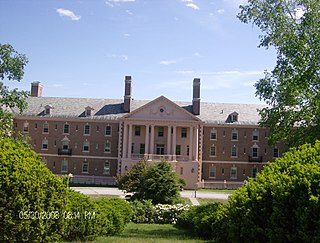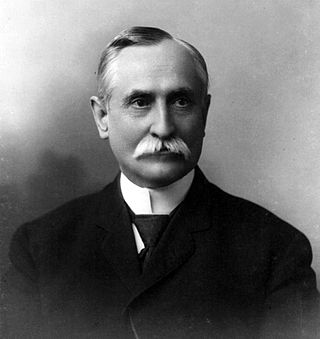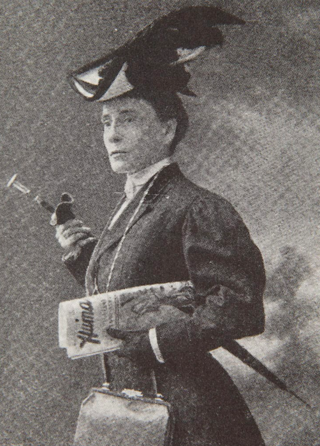Related Research Articles

Mary Baker Eddy was an American religious leader, Christian healer, and author, who in 1879 founded The Church of Christ, Scientist, the Mother Church of the Christian Science movement. She also founded The Christian Science Monitor in 1908, and three religious magazines: the Christian Science Sentinel, The Christian Science Journal, and The Herald of Christian Science.

Christian Science is a set of beliefs and practices which are associated with members of the Church of Christ, Scientist. Adherents are commonly known as Christian Scientists or students of Christian Science, and the church is sometimes informally known as the Christian Science church. It was founded in 1879 in New England by Mary Baker Eddy, who wrote the 1875 book Science and Health with Key to the Scriptures, which outlined the theology of Christian Science. The book was originally called Science and Health; the subtitle with a Key to the Scriptures was added in 1883 and later amended to with Key to the Scriptures.

A hymnal or hymnary is a collection of hymns, usually in the form of a book, called a hymnbook. They are used in congregational singing. A hymnal may contain only hymn texts ; written melodies are extra, and more recently harmony parts have also been provided.
The Christian Science Journal is an official monthly publication of the Church of Christ, Scientist through the Christian Science Publishing Society, founded in 1883 by Mary Baker Eddy. The first edition appeared on April 14, 1883, bearing the subtitle, "An Independent Family Paper to Promote Health and Morals". At that time, Eddy was the editor and main contributor to the Journal. The magazine is based in Boston.
Kingdom songs are the hymns sung by Jehovah's Witnesses at their religious meetings. The current hymnal used by the organization is "Sing Out Joyfully" to Jehovah. In addition to the current and previous hymnals containing sheet music and lyrics, releases in various audio formats have included vocals in several languages, piano instrumentals, and orchestral arrangements. The name "Kingdom songs" is in reference to God's Kingdom.
Decisions concerning the conduct of public worship in the Church of Scotland are entirely at the discretion of the parish minister. As a result, a wide variety of musical resources are used. However, at various times in its history, the General Assembly has commissioned volumes of psalms and hymns for use by congregations.

Septimus James Hanna, an American Civil War veteran and a judge in the Old West. He was a student of Mary Baker Eddy, who founded the Christian Science church. Giving up his legal career, he became a Christian Science practitioner, lecturer and teacher. Hanna occupied more leading positions within the church organization than any individual, serving as pastor, then First Reader of The Mother Church, as editor and associate editor of the periodicals, member of the Bible Lesson Committee, he served two terms as president of The Mother Church, he was teacher of the Normal (teachers) Class of 1907, later vice president and then president of the Massachusetts Metaphysical College.

The Massachusetts Metaphysical College was founded in 1881 by Mary Baker Eddy in Boston, Massachusetts, to teach her school of theology that she named Christian Science. After teaching for almost seven years, Eddy closed this college in 1889 in order to devote herself to the revision of her book, Science and Health with Key to the Scriptures, but retained her charter and reopened the college in 1899 as an auxiliary to her Church.

Hymns Ancient and Modern is a hymnal in common use within the Church of England, a result of the efforts of the Oxford Movement. The hymnal was first published in 1861. The organization publishing it has now been formed into a charitable trust, Hymns Ancient and Modern Ltd, and As of 2022 it publishes a wide range of hymnals as well as other theological and religious books and magazines, under imprints including the acquired publishers Canterbury Press and SCM Press.

The Dupee Estate, located at 400 Beacon Street in the village of Chestnut Hill, Newton, Massachusetts, was the last home of Mary Baker Eddy, the founder of Christian Science.
The Lutheran Hymnal with Supplement is the second official hymnal of the Lutheran Church of Australia, first published in its present form in 1989.

The Pleasant View Home is an historic senior citizen residential facility located at 227 Pleasant Street in Concord, New Hampshire, in the United States. On September 19, 1984, it was added to the National Register of Historic Places.

The Life of Mary Baker G. Eddy and the History of Christian Science (1909) is a highly critical account of the life of Mary Baker Eddy, the founder of Christian Science, and the early history of the Christian Science church in 19th-century New England. It was published as a book in November 1909 in New York by Doubleday, Page & Company. The original byline was that of a journalist, Georgine Milmine, but a 1993 printing of the book declared that novelist Willa Cather was the principal author; however, this assessment has been questioned by more recent scholarship which again identifies Milmine as the primary author, although Cather and others did significant editing. Cather herself usually wrote that she did nothing more than standard copy-editing, but sometimes that she was the primary author.

Rev. Irving Clinton Tomlinson was an American Universalist minister who converted to Christian Science, becoming a practitioner and teacher. For a time, he lived as one of the workers in the household of church founder, Mary Baker Eddy, later writing a book about his experiences called Twelve Years with Mary Baker Eddy.

Calvin Augustine Frye was the personal assistant of Mary Baker Eddy (1821–1910), the founder of Christian Science.

"Take Up Thy Cross, The Saviour Said" is an American Christian hymn written by Charles W. Everest. It was originally a poem published in 1833 but was later altered to become a hymn. It was then edited by English hymnwriter Sir Henry Baker for inclusion in the Church of England's Hymns Ancient and Modern hymnal.

Sibyl Wilbur O'Brien Stone, best known as Sibyl Wilbur, was an American journalist, suffragist, and author of a biography of Mary Baker Eddy. She was a San Diego Branch Member of the National League of American Pen Women and a member of the New England Woman's Press Association.

Adam Herbert Dickey, was an author, member of the Board of Directors of The First Church of Christ, Scientist, and a secretary to Mary Baker Eddy.

Violet Spiller Hay was a Christian Science teacher and hymnist. She was one of the first teachers of Christian Science in the United Kingdom and the religion's first teacher in South Africa.
References
- ↑ Jackson, George Pullen (1953). Spiritual folk songs of early America. Locust Valley, N.Y.: J.J. Augustine. p. 22.
- ↑ Lovelace, Austin C. (1981). The organist and hymn playing. Carol Stream, I.L.: Agape. pp. 22–23. ISBN 9780916642167.
- ↑ “What’s the background on Eddy’s poems that are set to music in the Christian Science Hymnal?” Mary Baker Eddy Library. 12 December 2011
- 1 2 The Christian Science Hymnal Longyear Museum. 24 April 2014
- ↑ Lyman F. Brackett hymnary.org
- ↑ Christian Science Hymnal. Boston: Christian Science Publishing Society. 1895. p. i.
- 1 2 Did Mary Baker Eddy approve all the selections in the 1932 “Christian Science Hymnal”? Mary Baker Eddy Library. 26 October 2017
- ↑ We Knew Mary Baker Eddy v. II. Boston: Christian Science Publishing Society. 2013. p. 556.
- ↑ Hodgson, Peter J. (2005). Violet Hay. Chestnut Hill, M.A.: Longyear Museum Press. pp. 33, 39.
- ↑ Christian Science Hymnal. Boston: Christian Science Publishing Society. 1932. p. v.
- ↑ The Christian Science Hymnal. Boston: Christian Science Publishing Society. 1910. p. iii.
- ↑ "Announcing the Christian Science Hymnal: Hymns 430–603". 19 May 2017.